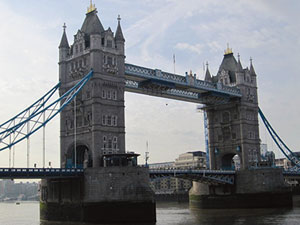 |
|||||||||
|
|
|||||||||
|
NTT around the World Vol. 8, No. 12, pp. 29–33, Dec. 2010. https://doi.org/10.53829/ntr201012ov1  DOCOMO Europe
|
|||||||||
| † | DOCOMO Europe St. Katharine’s Way, London E1W 1LB, UK |
|---|
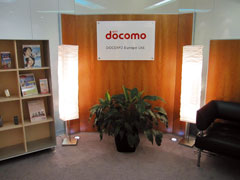
Entrance of DOCOMO Europe.

St. Katherine”Ēs dock located near the office.
1. Introduction
DOCOMO Europe Limited was established in London in September 2000 and was incorporated as a European holding company in September 2002. Its main activities can be summarized as follows.
(1) Promote customer service for Japanese firms and individuals in Europe.
(2) Survey and report on the mobile communications industry and related business fields in European countries.
(3) Promote investor relations activities in Europe.
The company currently has more than 20 employees. With a Japanese-language mobile phone service launched in 2008 and the first overseas DOCOMO support desk set up in London on May 29, 2009, DOCOMO Europe is focusing its efforts on loyalty marketing in Europe.
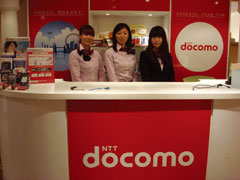
Support desk in London Mitsukoshi.
2. NTT DOCOMO support desk in London
DOCOMO Europe opened a DOCOMO support desk inside the London Mitsukoshi department store with the aim of improving customer service for overseas customers. London Mitsukoshi is situated near Piccadilly Circus, a prime London location bustling with tourists. As a common destination for group tours, this prestigious department store caters to many tourists from Japan, but it also counts Japanese living in the UK as year-round patrons. All in all, more than 300,000 Japanese customers come through its doors annually. This support desk provides various kinds of overseas support including help with sending and receiving Japanese-language email and operating and charging handsets. Since its launch in such a leading European site with a high concentration of Japanese visitors, many people have come by and Japanese living in the UK are gradually becoming more aware of it through Japanese community newspapers and other UK media. It is helping to increase the DOCOMO brand value overseas. The main types of business handled by the DOCOMO support desk are summarized below.
(1) Short-term traveler support: Providing support for tourists and business travelers in relation to handset charging and operation enquiries, handset loss or theft, etc.
(2) DOCOMO handset reservation for customers returning home: Processing new DOCOMO contracts for customers whose overseas assignments are coming to an end. A customer returning to Japan can receive his or her phone number in Japan in advance and collect a handset upon arrival at various Japanese airports including Narita, Chubu Centrair, and Kansai, enabling customers to start using their phones immediately upon returning home.
(3) Support for mobile phone services for customers living in the UK: Introducing the Japanese-language mobile phone service called “berry mobile” (described below) provided by a2network Corporation*1.
| *1 | a2network Corporation: A venture company handling the berry mobile business in the UK, Germany, Belgium, and Thailand. |
3. Japanese-language mobile phone service “berry mobile”
Since December 2008, DOCOMO Europe has been active in promoting the sale of the berry mobile Japanese-language mobile phone service [1] offered for Japanese living in the UK by a2network Corporation (Fig. 1).
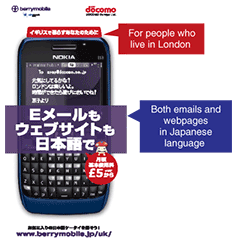
Fig. 1. berry mobile.
(1) Service outline
- Japanese-language email (SMS/email): Enables customers to exchange emails with personal computers and mobile phones in Japan in Japanese without having to make bothersome settings (SMS: short message service).
- Japanese-language content: Provides convenient information about local restaurants and other services (UK Navi) as well as weather, exchange rates, and other types of useful information.
- Inexpensive international phone calls from the UK to Japan: Provides easy-to-use international phone calls at low rates.
(2) Provision of the i-channel service in the UK
With the aim of enhancing the mobile-phone experience for customers living in the UK, DOCOMO Europe has been providing the i-channel service as a supplementary service of berry mobile since November 2, 2009. The UK version of the i-channel service automatically displays various kinds of information provided by the Mainichi Shimbun (newspaper) in telop (scrolling text) form on the standby screen of i-channel-compatible handsets. This information includes Japanese news, the latest in Japanese sports and entertainment, weather updates for the UK and its environs, and commentary on current news in Europe. The user can also press the i-channel button on the screen to display a list of up-to-date information and can select any particular news item for more detailed information (Fig. 2). In addition to providing up-to-date news from Japan, the i-channel service also makes it easy for customers to use mobile phone content even if they have had no prior experience in doing so.
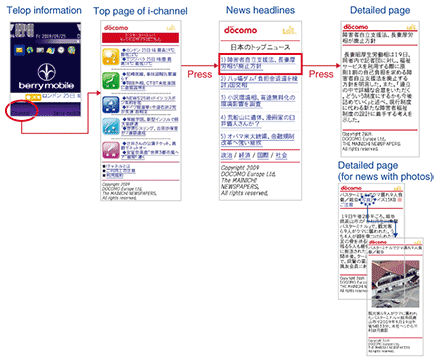
Fig. 2. Display screens of berry mobile.
4. Corporate business
DOCOMO Europe is located near the City, one of the world’s leading financial markets. We are therefore in an ideal environment to support the business of Japanese companies in the UK, and we are expending efforts to grow our corporate business. On July 9, 2010, DOCOMO Europe concluded a sales-representative agreement with Telefónica International Wholesale Services S.L.*2 (TIWS), a subsidiary of Spain’s Telefónica, pertaining to mobile phone lines for Japanese companies in Europe. This agreement enables us to provide mobile solutions including mobile phone lines to Japanese companies in Europe. Specifically, it enables us to sell mobile phone lines of the Telefónica O2 group on commission, to make use of NTT DOCOMO know-how from Japan, and to expand our systems integration business in Europe. In cooperation with NTT Europe, we are supporting the construction of a Japanese-language environment ranging from the configuration of handsets to the deployment of servers. In this way, we believe that we can offer our customers a one-stop total solution.
| *2 | Telefónica International Wholesale Service S.L.: A Telefónica group company providing wholesale global communication services such as voice communications, data communications, and mobile communications and services for multinational corporations with a focus on Europe, North America, Central America, and South America. |
5. ISO-related activities
5.1 Background
DOCOMO Europe works to acquire and maintain ISO9001 and ISO27001 certifications standardized by the International Organization for Standardization (ISO).
5.2 ISO9001 and ISO27001
ISO9001 certification is an international standard governing quality. In November 2009, DOCOMO Europe acquired certification for the “ISO9001:2008” Quality Management System under the auditing of the British Standards Institute (BSI) for its Returnee Service (Fig. 3).
ISO27001 certification is an international standard governing information security. With the aim of establishing thorough information management procedures at DOCOMO Europe and preventing the leaking of customer information handled in the course of providing services, we have been strengthening information security towards acquiring ISO27001 certification in December 2010.
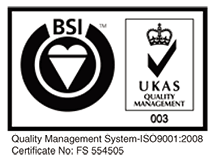
Fig. 3. ISO9001.
5.3 ISO introduction
It has been said that introducing international standards into a company can be difficult, but simply said, it can be done by establishing goals and creating a mechanism for achieving them (management system). For example, the following goals can be established in relation to quality as stipulated by ISO9001:
- Reduce defects and incompatibilities in services as much as possible and minimize the scope of their impact.
- Continually review and improve the appropriateness and effectiveness of services.
- Treat customers with dedication and respect when responding to their requests.
- Provide services that give customers peace of mind.
- Always provide customers with the latest news about services provided within Japan.
In terms of a management system, we have constructed a support system for performing ongoing kaizen (improvement) activities based on the concept of the plan-do-check-act cycle (Fig. 4). This system has enabled us to periodically evaluate the effectiveness of our solutions and the extent to which we have met our quality goals and to maintain and improve quality in our services.
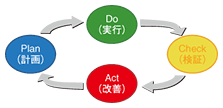
Fig. 4. Management system structure.
5.4 Effects of ISO introduction
The introduction of the ISO9001 standard can be considered to produce the following effects.
- A quality management system that is more effective than one conceived within the company can be constructed.
- Customers can feel reassured that the company has acquired quality-related certification from a third-party institution.
- Customer satisfaction with services can be raised.
Among these effects, DOCOMO Europe is paying particular attention to customer satisfaction. To ensure that our customers are satisfied with our services, we are focusing our efforts on ongoing kaizen activities and measures for improving service quality.
We can expect the introduction of ISO27001 to not only prevent the leaking of customer information but also to clarify information-security policies so that we can ascertain current security levels and determine the extent to which security should be maintained. Finally, as a company that handles customer information, we can expect the introduction of ISO27001 to help instill a sense of confidence in our own customers.
6. Future prospects
At DOCOMO Europe, we are committed to raising the quality of support at our London support desk and to promoting the sale of berry mobile services with the aim of bringing overseas customer service to an even higher level. Similarly, in the area of corporate business, we are united in making an even greater effort to satisfy our corporate customers with total solutions. At the same time, we are working diligently to strengthen information security in an ongoing manner with the aim of acquiring ISO27001 certification in December 2010.
Reference
| [1] | http://www.docomo-europe.com/indivisual/stay.html#four |
|---|
DOCOMO Europe — short column
Among the various means of public transport in London, probably the most well-known is the Tube (the London subway system), which even us expatriate employees use to commute to work. But since July 30, 2010, a new means of transport has been available in London: a bicycle rental system, which was launched with the aim of easing crowding on the Tube and the buses.
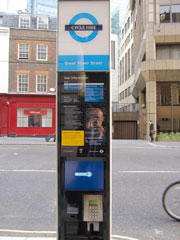
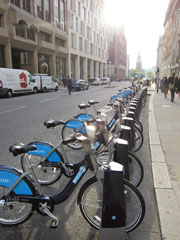
Rental-cycle-parking area.
Bicycle rental systems have already been introduced in Paris, Amsterdam, and other cities in Europe, and there is even one in Japan, which was started in Toyama city in March 2010. Since its launch, London’s cycle hire system has been flourishing. About 6000 bicycles have been provided at about 400 locations in central London. This is a self-service system in which bicycles can be rented and returned to any of these 400 docking stations. Reservations are unnecessary, and anyone can rent a bicycle at any time as long as one is available.
The system allows a bicycle to be hired for up to 24 hours. Rates are relatively inexpensive: journeys under 30 minutes are free, those up to an hour cost £1, and a full 24 hours runs to £50. At these rates, London’s cycle hire system is expected to become a new way for Londoners to get around the city.
However, users need to be aware that returning a bicycle after the 24-hour maximum will incur a late fee of £150 and damaging one can generate a fine as high as £300. Before introducing the system, the Greater London Authority conducted a sale of sponsorship rights that would enable companies to attach their names to the system and a sale of advertising rights to place ads on individual bicycles. Both of these rights were purchased by Barclays, a major high-street bank. Each bicycle in the system is marked with the Barclays name and blue logo, and the system has assumed the look of Barclays advertising posts with the words “Barclays Cycle Hire”.
In London, however, exclusive cycle paths like those in The Netherlands have not yet been constructed. Cyclists must therefore use the roads, and with the considerable amount of automobile traffic in London, they must be alert and careful at all times. They say, however, that a number of cycle paths are now being set up. I think the use of bicycles throughout the city will increase in the years to come.
Although I have now become accustomed to commuting to work in the humid conditions of the Tube (which has no air conditioning), I wonder if I will someday commute by bicycle as I catch glimpses of Londoners dashing through the city on their bikes.
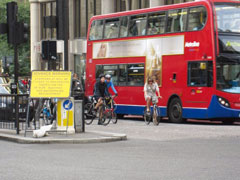

Commuters on bicycles.







